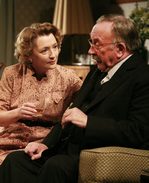SITE GUIDE
SEARCH
REVIEWS
REVIEW ARCHIVES
ADVERTISING AT CURTAINUP
FEATURES
NEWS
Etcetera and
Short Term Listings
LISTINGS
Broadway
Off-Broadway
NYC Restaurants
BOOKS and CDs
OTHER PLACES
Berkshires
London
California
New Jersey
DC
Connecticut
Philadelphia
Elsewhere
QUOTES
TKTS
PLAYWRIGHTS' ALBUMS
LETTERS TO EDITOR
FILM
LINKS
MISCELLANEOUS
Free Updates
Masthead
Writing for Us
A CurtainUp  London Review
London Review
 London Review
London ReviewGrief
|
I said, "Geoffrey what exactly is a computer?" and his explanation lasted all the way through lunch and most of supper!
— Hugh
|

Lesley Manville as Dorothy and Sam Kelly as Edwin (Photo: John Haynes) |
Before supper Dorothy and Edwin will have a glass of sherry, she drinks the pale kind, he the tawny variety, and they may sing a Cole Porter duet together like "Goodnight Sweetheart". Dorothy, looking flustered, will apologise to everyone for not taking off her pinny before coming into the sitting room. Victoria will come in, be rude to her mother and leave slamming doors, except that the sound of door slamming is not quite substantial enough to be a genuine 1930s semi door but something less noisy and part of a stage set. Thank goodness however for the door slamming because without it I fear I might have nodded off.
Some visitors brighten the play momentarily: David Horovitch is Hugh the animated doctor who laughs uproariously at his own jokes and boasts about his clever son. Marion Bailey gives a superb performance as Dorothy’s former workmate Gertrude, Garrulous Gertie, who talks non stop and is so full of herself, her son and her holidays. Wendy Nottingham plays the third ex-telephonist Muriel who prattles and preens in the latest fashions. Completing the cast is Dorothy Duffy as Maureen the Irish cleaner who will clean Dorothy’s house three times a week. I couldn’t quite tie in the three times a week cleaner with the telephonist class and a widow strapped for cash. On reflection the telephonist job was probably middle class women helping with the wartime effort.
This study of repression and the 1950s runs for two hours without a much needed break as the ennui of home life in 1957 is conveyed to the audience. The scenes are very short and are punctuated with the ’cello. It must be the week of the ’cello between scenes (see my review of Broken Glass, although the Mike Leigh music is altogether more poignant and pleasant. The play will end like a Chekhov with melodrama. Although rather contrived it is mercifully played off stage like a Greek tragedy.
The performances are pitch perfect. Lesley Manville is a director’s dream as she conveys the slightest directorial intent. She appears apologetic, vague, self effacing, diffident with a nervous laugh, except when it comes to laying down the law about when Victoria may have a glass of sherry. I adored Sam Kelly’s affectionate portrayal of the long term employee whose retirement silver salver has his name spelt wrongly on the engraving. Dorothy would like it to be fixed but resignedly Edwin accepts the error.
The message is that after 40 years’ loyal employment they cannot even be bothered to spell his name correctly and he is past caring. Ruby Bentall just has to be excessively unreasonable as Victoria, flounce a lot and refusing to go out with her mother and uncle to the restaurant for the planned meal on her sixteenth birthday and exploding at the slightest provocation or none at all. Marion Bailey as the insensitive Gertrude finishes everyone’s sentences for them and Wendy Nottingham’s Muriel is entirely self absorbed and vain. Alison Chitty’s sitting room (or should that be lounge?) boxed set is in period with a glimpse of the hallway and staircase beyond in the 1930s built semi with a bay window.
Maybe Leigh’s point is the air of depression which hangs over the house since the death of Victor in the war, whose photo is framed above the bookcase. I never saw anyone reading a book or listening to the radio. I can’t remember the hall telephone ringing and despite it being 1957, television doesn’t seem to have invaded this semi-detached home. I don’t know any teenager who would not have listened to popular music on the radio but all we heard was the ’cello.
I couldn’t call this a fun evening in the theatre. It left me wishing that Mike Leigh had given the talented cast a bit more to work with because Grief left me wishing for the action of a play by Samuel Beckett.
|
Subscribe to our FREE email updates with a note from editor Elyse Sommer about additions to the website -- with main page hot links to the latest features posted at our numerous locations. To subscribe,
E-mail: esommer@curtainup.comesommer@curtainup.com
put SUBSCRIBE CURTAINUP EMAIL UPDATE in the subject line and your full name and email address in the body of the message -- if you can spare a minute, tell us how you came to CurtainUp and from what part of the country. |
| Grief
Written and directed by Mike Leigh Starring: Lesley Manville, Sam Kelly, David Horovitch, Marion Bailey, Ruby Bentall With: Wendy Nottingham, Dorothy Duffy Designed by Alison Chitty Lighting: Paul Pyant Music: Gary Yershon Sound: John Leonard Running time: Two hours without an interval Box Office: 020 7452 3000 Booking to 28th January 2012 day seats only as sold out Reviewed by Lizzie Loveridge based on 24th September 2011 matinee performance at The Cottesloe, National Theatre, South Bank, London SE1 9PX (Rail/Tube:Waterloo) |
|
REVIEW FEEDBACK Highlight one of the responses below and click "copy" or"CTRL+C"
Paste the highlighted text into the subject line (CTRL+ V): Feel free to add detailed comments in the body of the email . . . also the names and emails of any friends to whom you'd like us to forward a copy of this review. |




